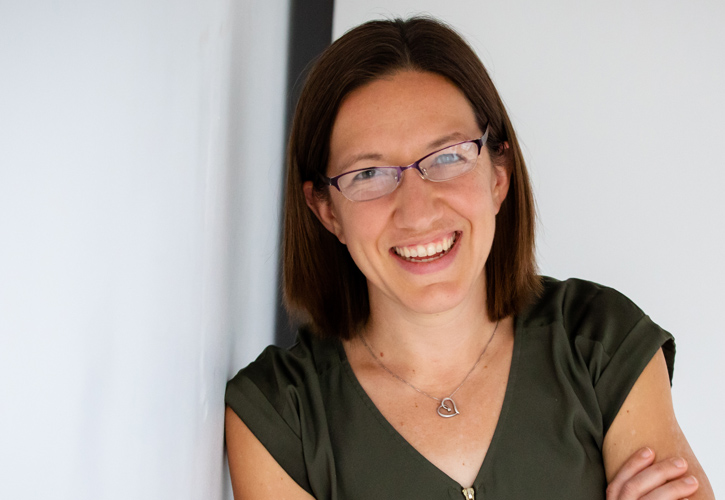College of Arts and Sciences Newsroom

University of Dayton faculty seek to promote ethics and leadership in curriculum and co-curricular activities
By Allison Brace '22
Christa Johnson, visiting assistant professor in the University of Dayton Department of Philosophy, seeks to further the University’s Catholic, Marianist mission to educate the whole person through integrating ethics and leadership into the academic curriculum and through co-curricular experiences.
Johnson is working with Danielle Poe, professor of philosophy and College of Arts and Sciences associate dean for curriculum and academic outcomes, to create an undergraduate certificate as part of a larger, ongoing initiative to bring together curricular and co-curricular experiences in ethics and leadership. The goal is to bring these ideas together in a holistic and individualized vision that will prepare graduates to face moral issues with an ethical compass and be leaders regardless of where they are on their career path.
“At the end of the process we hope that each student would graduate with a clear vision of what ethics means to them and how to implement that in their community, careers and personal lives,” Poe said. “Central to being able to do that is having those leadership qualities that no matter what position a person is in they can still act in a leader-focused way.”
Johnson is a philosopher trained in ethics and the application of ethics. She took part in founding The Ohio State University Center for Ethics and Human Values as a graduate student. As a visiting professor, Johnson teaches one ethics course per semester at the University of Dayton.
Similar to her mission at UD, the center at OSU started as a small initiative that evolved into a hub for ethics resources that includes programming, events and student groups. Some of these programs include: art contests, film series, and research ethics training.
“During my time at OSU, I was always seeking ways to reach more undergraduates,” Johnson said. “We developed many programs, explored different themes such as sustainability and inequality, sought out speakers and helped bring awareness about the center.”
Her experience parallels the ongoing initiative Poe launched in 2016, emphasizing faculty development to understand how questions of ethics and leadership impact specific majors. Poe facilitated a series of six faculty seminars about the role of ethics within various academic disciplines and as a result, nine faculty members received grants to support the development of ethics modules for their courses.
“Ethics is the core of what leadership means, so it doesn’t matter if you have positional authority, the ethics of understanding commitment and practicing leadership is what it really means to be a University of Dayton graduate,” Poe said.
This ethics and leadership initiative will look at issues in the local and global community and allow students to apply critical thinking and reasoning to these issues related to their own areas of study.
“I want to recognize that students have many classes to take to get their education, which is why I am working to create an ethics and leadership certificate program that provides a pathway for students with some curriculum, but a larger focus on co-curricular and experiential learning opportunities,” said Johnson.
Students who participate in this initiative will be provided with a mentor during their time at the University and after graduation. The certificate will culminate with a capstone project in which students, working with this mentor, can choose to explore and articulate their own values further or apply what they have learned to a community need or an ethical dilemma in their major field.
Plans call for partnerships with the Fitz Center for Leadership in Community, the University of Dayton Center for Leadership, Student Involvement and Leadership, among other University organizations, to help promote this integration of ethics and leadership into all areas of a University of Dayton education.
These partners will assist with providing co-curricular leadership opportunities for the students, encouraging them to think critically about what it means to be a leader.
“The work being done now is bringing together different ethics and leadership opportunities on campus and creating new opportunities,” Poe said.
Despite the coronavirus pandemic, work on these efforts has continued with help and resources provided by several College alumni donors who have asked to remain anonymous.
Johnson hopes to provide undergraduate students a platform to reflect on their own ethics and personal leadership values to give them structured views to live by. Combining experiential and classroom experiences, students may expand on their ethics competency. She wants to help students decipher their own ethical values and expand their ability to be leaders beyond the typical classroom experience.
“Having that experience starting from scratch at OSU and seeing the success of the Center for Ethics and Human Values gives me confidence that UD’s initiative can become something very successful,” Johnson said.
For more information, visit Johnson’s faculty profile page.
